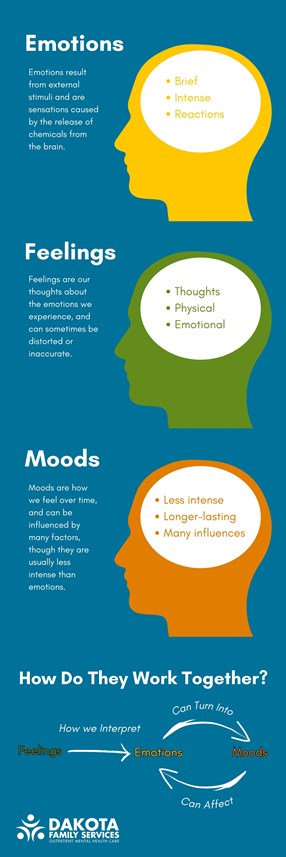While most of us have a general idea of what it means to be in a good mood versus a bad mood, we might find it more difficult to explain the difference between moods, feelings, and emotions.
Learning the definitions of mood, feelings, and emotions—and how they interact and influence each other—can help us manage them when they affect our lives. Let's start with some definitions.
Emotions

Emotions, which originate as sensations in the body, are intense feelings (exhilaration, terror, despair) that last only seconds to minutes. They are controlled by chemicals our brains release in response to a trigger or event—basically our body's response to whatever is happening around us. The chemicals go throughout our body, forming a feedback loop between our body and brain, creating emotion.
Emotions are always based on an external stimulus, and almost always come and subside quickly. In addition to being specific and a reaction to something, emotions have corresponding and universal facial expressions and body language.
Feelings
While emotions start as sensations in the body, feelings are generated from our thoughts about those emotions. Or in other words, feelings are how we interpret emotions and let them sink in.
We use the word, "feel," for both physical and emotional states. For instance, we can "feel cold" both physically and emotionally. Feelings can be diluted or distorted by the stories we've unconsciously created based on past events or experiences.
Moods
A mood is a state of mind or a general feeling that can influence your thoughts, behaviors, and actions. Moods tend to be less intense than emotions and do not necessarily depend on an event or trigger. Rather than being how you feel in each moment, your mood is how you feel over time.
Moods are influenced by the environment, diet, exercise, physical health, and what you choose to think about. They can last minutes, hours, or days, and they have no unique corresponding nonverbal facial expressions or body language.
How do they work together and why does it matter?
Emotions, feelings, and moods all work together to impact how we perceive and live in the world around us. For instance, when we are in a bad mood, we tend to experience sadness, anger, and/or fear, and when we are in a good mood, we tend to experience happiness and/or hope. If we are sad, angry, and afraid, we may then feel worthless and like our life doesn't matter. (Check out our podcast episode Why Do I Feel Sad?)
Conversely, strong feelings or emotions can affect your mood.
In the end, it's more about how you function in the world than understanding the differences between emotions, feelings, and moods.
If you're feeling overwhelmed by strong emotions, feelings, or moods, consider talking to a therapist about how they might be affecting your life.


